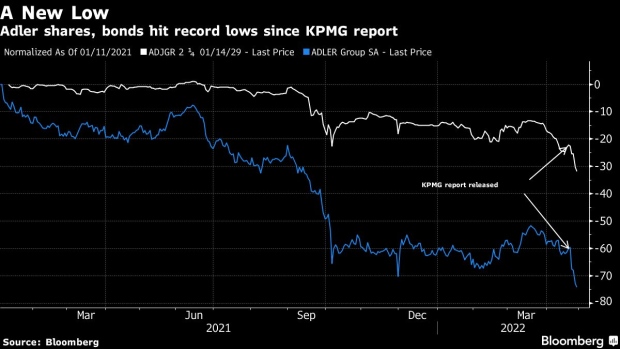Apr 30, 2022
Adler Posts $1.24 Billion Loss in Report Auditor Won’t Endorse
, Bloomberg News

(Bloomberg) -- Adler Group SA posted a 1.18 billion-euro ($1.24 billion) loss last year on a major goodwill impairment, in annual results that the company’s auditor declined to endorse.
The embattled German landlord wrote down the value of its Consus development business by 1.08 billion euros, blaming construction inflation and supply chain bottlenecks that had forced it to revise assumptions about the likely profitability of its projects, according to the delayed full-year earnings statement Saturday.
Auditor KPMG refused to provide an opinion on the accounts after Adler withheld correspondence about related party deals that are a focus in fraud allegations by short seller Fraser Perring. That meant auditors were unable to judge whether the deals, for which Adler is still owed money in some cases, had been accounted for properly, KPMG said.
The delayed earnings report comes days after Adler released findings of a KPMG probe into the allegations made by Perring’s Viceroy Research in October. The publication of the probe triggered a further sell off in the company’s stock and bonds because KPMG was unable to refute many of the accusations and found a series of corporate governance failings.
Key to Perring’s accusations were valuations Adler placed on its holdings and deals between the landlord and companies linked to some of its backers, including the extended family of Austrian financier Cevdet Caner. Adler is still owed money for some of the deals, which date back several years. It has refused to write off the sums despite recommendations from KPMG that it should mark down the receivables from at least on of the deals.
The company on Saturday acknowledged there was a risk it may not recover 58.6 million euros it is owed by Azeri investor Natig Ganiyev, who agreed to buy its Accentro unit in 2017. It now has more than 423 million euros in in outstanding receivables. That’s down from a restated figure of 461 million euros for 2020.
The company’s property portfolio was valued at 9.97 billion euros at the end of December, down from 11.7 billion euros a year earlier following sales designed to cut debt. Adler’s loan-to-value ratio -- a key metric for real estate companies that measures relative indebtedness -- was 50.9%, down from 54.3% a year earlier.
Adler, which had rapidly grown into one of Germany’s biggest landlords through debt-fueled acquisitions and a controversial merger, has spent much of the last year reeling from the allegations by Viceroy as well as an anonymous whistleblower, who sent information to the firm’s banks. The company sold off about 40% of its 70,000 apartments in an effort to pay down a debt pile that had reached $9 billion.
In the past week, since KPMG released its report, Adler’s shares have lost 38% of their value and are trading at a record low. While KPMG’s investigators satisfied themselves that the bulk of Adler’s portfolio was valued accurately, they were unable to disprove many of the other claims.
©2022 Bloomberg L.P.





